Godwin can’t wait to tell you about how receiving a free, high-quality education at St Jude’s has changed his life.
The aspiring electrical engineer graduated last year, topping his class in both maths and science and is currently completing his Beyond St Jude’s Community Service Year as a volunteer teacher in an under-resourced, local government school.
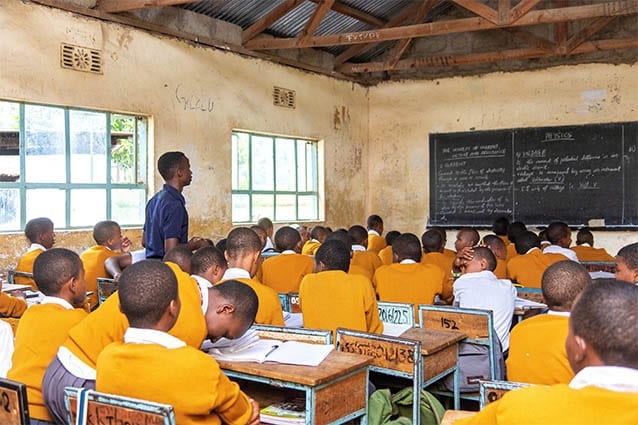
His sense of community spirit, determination and aptitude has certainly paid off; in addition to being invited by Gemma to join her for St Jude’s 2019 international promotional tour, Godwin recently found out he has successfully earned a full scholarship to study a Bachelor of Engineering in the United States.
“It has been a great year for me so far! I have so many opportunities in my hands, and it is all thanks to The School of St Jude. It is my great pleasure and honour to meet so many St Jude’s supporters, the people who have helped me become the young man I am, and thank them for what they have done, what they have given me,” Godwin said.

Like so many of our students, Godwin, who was raised by a single mother, has faced significant obstacles and challenges along the road to success.
“I did not start at St Jude’s until secondary school, in 2012. I attended a government primary school and we did not have enough seats, teachers or textbooks. I remember each day around lunch time, I was so hungry that all I could do was daydream about drinking the porridge my mum would cook in the afternoon. It was all we would eat for the day,” he shared.
“Sometimes, we had to skip meals. When I came to St Jude’s, it was like paradise. We had three meals a day and everything a student needs to study hard. We were encouraged by our teachers. Thanks to St Jude’s, I had chances to enter essay competitions and was fortunate to even win some of them. These small victories gave me confidence when I was applying for university scholarships. I have had a golden chance and the sky is the limit!”
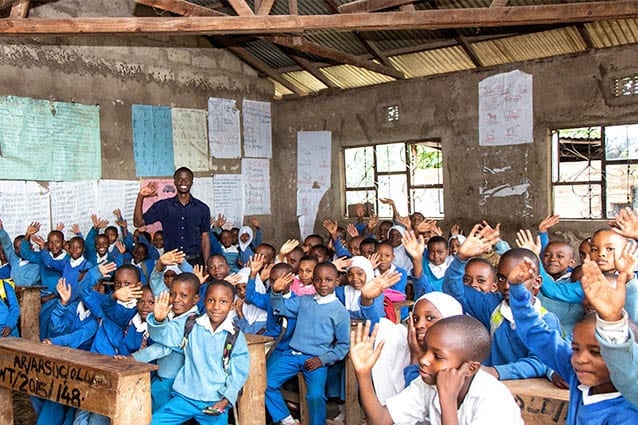
Godwin’s educational journey has come full-circle. He is completing his Community Service Year at the secondary school he would have attended, had he not been accepted into St Jude’s.
“I look at my students and see in comparison how tough it is for them. The government school has only two physics teachers for 1,500 students. There is no doubt that education is the most important weapon to fight poverty, and St Jude’s supporters are helping us do this every day.”
Don’t miss out on the opportunity to meet Godwin and find out more about how St Jude’s is changing lives. Stay updated with our 2019 tour itinerary!
Exam results are out for our Form 2 students and the hard work and diligence of the entire year level is clear, with over 75% of our students receiving the highest possible division points and every student ranking within the top division.
This year’s results, as well as being a success for the whole class, included a first in St Jude’s 17-year history as well as one of the greatest stories of determination and resilience we’ve ever seen.
Samson is one of our students whose results have earned him national recognition. He was awarded an academic scholarship to attend St Jude’s at the age of 7 and is one of three children to a widowed mother from the outskirts of Arusha.
Samson placed first of all Form 2 males in the country and seventh out of all students in Tanzania.
“My family they are really happy for me. They are really excited and they are proud of me” said Samson.

Achieving these results with the help of the school, his peers and family, Samson also credits the hard work of his teachers in his success.
“Our teachers they did a lot. They have been coming in during weekends and also they have been extending their lesson hours just to teach us and to give us the experience for questions asked in the examinations.”
Edwin, another of our students who started at the school in Standard 1 received national recognition for his achievement too and placed 10th of all males nationwide in his exams.
“I’m feeling so great about my results and I cannot explain how excited I am because they are wonderful results and actually I didn’t expect I could get results like this ever in my life,” said Edwin.
“I spoke to my family about it and they were really excited also. They were super excited. I couldn’t imagine. It was really the best moment when I received the results.”
It’s not just the boys who excelled, all of St Jude’s Form 2s performed well and one girl in particular has shown what determination, resilience and hard work can achieve, even in the face of extraordinary challenges.
Lightness, alongside her peers, placed in the first division in the national exams. Unlike her peers, she uses her feet to write her examinations.
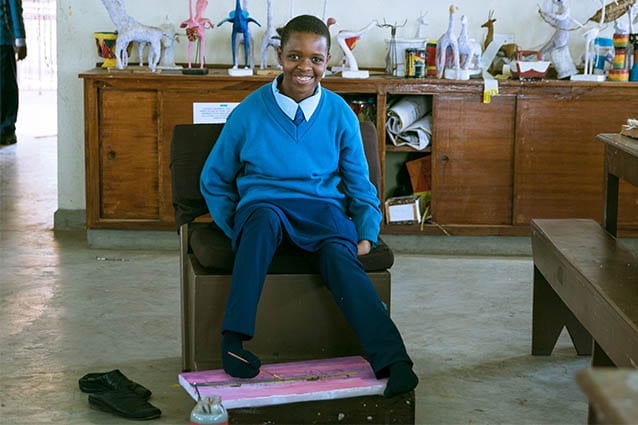
Lightness has cerebral palsy, a condition that affects muscle coordination, making it difficult for her to have the necessary control to use her hands to write. Instead, she has learnt to write and draw by holding the pen between her toes.
The condition is often stigmitised in Tanzania and inadequate facilities in government schools would make it almost impossible for her to complete her schooling if she were not at St Jude’s.
With the support of her mother, sponsors, donors and the school, Lightness is able to excel academically in an environment that provides the right resources for her wellbeing and success, including an adapted keyboard for the computer and additional assistance in boarding.
“I did well because of the school, the extra facilities, books and mostly that our teachers are very good. I’ve been working very hard also with my friends,” Lightness said.
When it comes to the year ahead, she can’t wait to continue beating the odds and showcasing her ability.
“In Form 3 I want more A’s and I want to work even harder than before.”
St Jude’s Secondary Headmaster, Mr Mcharo knows that Form 2’s unprecedented success is not just a happy accident.

“We set out at the beginning of the year with strong teamwork, all working towards the common goal of excellence. With discipline and planning we made sure to create an environment that was the best it could be for both teaching and learning. The results speak for themselves and we are looking forward to more of the same,” Mr Mcharo said.
We couldn’t be prouder of every single one of our Form 2 students and their amazing exam results. Their achievements are inspiring every student at St Jude’s and spurring us all on to new heights.
Support one of our aspirational students by sponsoring an academic scholarship today.
While most students spend their school holidays taking a well-earnt break from study and catching up with friends and family in their home communities, Lina, a current Form 6 student, is going the extra mile to make an impact on children and their parents in her village.
You may recognise Lina as one of the faces of our 2018 Annual Appeal. Her enthusiasm and compassion shine radiantly through her smile, and she is respected among her peers as a role model and friend to all.
Lina gathered together 15 of her St Jude’s compatriots during the school holidays to volunteer in local government schools, helping students to improve their English. The program, which comes free of charge to all who participate, was so successful, that Lina took her English lessons into students’ homes and also teaches their parents, many of whom have not themselves completed primary school.
“We at St Jude’s have grown up receiving. We understand about giving to the community from the bottom of our hearts,” Lina expressed.
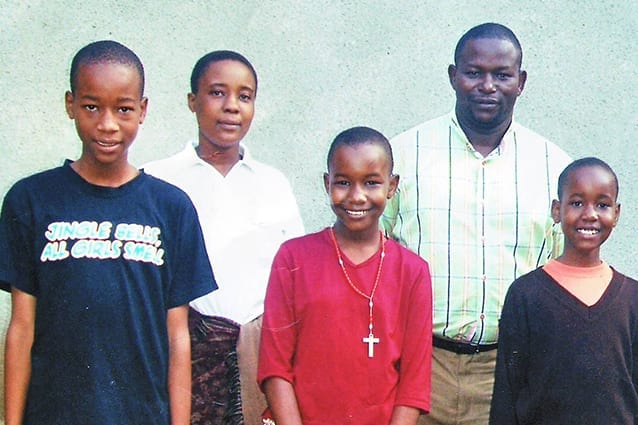
“So far, I have helped 10 parents to improve their English speaking ability. Many parents who run small businesses are exploited by people who take advantage of their lack of education. With improved English, they can better understand the conversations being had around them and empower themselves.”
“To order stock for a business, you sometimes need to order things online, and the main language is English. Many parents also want to help children with their homework sometimes, but they cannot, because they do not understand the language their children are learning,” she added.
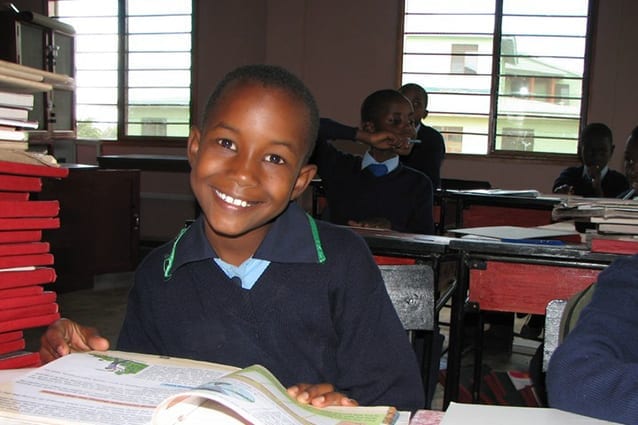
Lina has successfully overcome a number of challenges in her pursuit of service, and is keen to expand her reach.
“Some parents did not believe that I do not want money for this. When they can see I am serious about volunteering, they realise I have a genuine heart to help the community, and they give me their very best wishes.”
“I really feel this project has a bright future. My main aim is to help St Jude’s students who are privileged to receive free education, understand the importance of helping others. I hope to complete Form 6 successfully and join Beyond St Jude’s. I want my friends to do the same, so we can help to address the problem of lack of resources in government schools.”
St Jude’s Earlyactors, Interactors and Rotaractors have been busying themselves with several significant projects during the second half of this year! Read on to find out what they’ve been up to, and a special announcement about St Jude’s Rotary Specialist, Laura!
WORLD CLEANUP DAY
St Jude’s participated in World Cleanup Day, a globally recognised initiative that mobilises local communities to rid their streets of waste and dispose of rubbish responsibly.
Rubbish pollution is a huge problem in Tanzania, with little formal regulating or waste disposal. On World Cleanup Day, 16 members of our Interact and Rotaract clubs assembled bright and early in Moshono, where Sisia Primary Campus is located, and filled nine industrial-sized garbage bags with waste found along the roadside.
Members of the team remarked that they felt happy to contribute positively to the local community and the environment. They made sure to have funat the same time, competing amongst themselves to see who could collect the most rubbish!
END POLIO NOW WALK
World Polio Day is commemorated annually on October 24. Polio, a preventable disease, remains prominent in parts of Africa. Despite intermittent weather conditions, Rotary, Rotaract and Interact groups from around Arusha walked six kilometres to raise awareness and funds to end polio. St Jude’s Founder, Gemma Sisia, joined the walk with our Interactors and Rotaractors.
“It was wonderful to see our school represented by so many passionate students and staff, in solidarity with Arusha’s strong Rotary community,” Gemma said.

DISTRICT GOVERNOR VISIT
Hot on the heels of the End Polio Now Walk, came a visit to Arusha from Rotary District Governor, Sharmilla Bhatt. DG Sharmilla Bhatt attended the Rotary Club of Arusha’s meeting on October 29, to which St Jude’s Earlyactors received an invitation.
At the meeting, Earlyactors performed their original sustainability song, titled, Reduce, Reuse, Recycle, for the Rotarians. The performance received a standing ovation!
“Rotarians and the District Governor joined us to sing the chorus, we taught them the words. They all told us we had done a good job to make such a nice song!” Theresia, an Earlyactor in Standard 6, said.
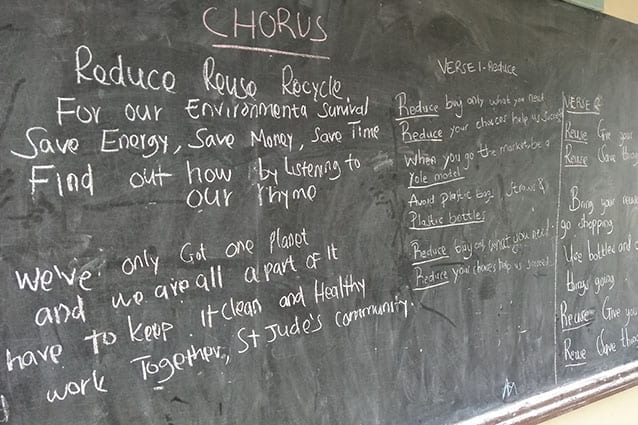
PAUL HARRIS FELLOWSHIP
In the presence of Earlyactors and fellow Rotarians from the Rotary Club of Arusha, our very own Rotary Specialist, Laura, was awarded a Paul Harris Fellowship by DG Sharmilla Bhatt.
At 27 years old, Laura is the second-youngest Rotarian in District 9211 and, since arriving in Arusha in March, has made a significant contribution to the Rotary community – hence her nomination for the fellowship by the Rotary Club of Arusha.
Paul Harris Fellowships recognise individuals who contribute, or who have contributions made in their name, of $1,000 to The Rotary Foundation of Rotary International. Laura now joins the ranks of notable figures, including past United States Presidents, astronauts and philanthropists, who have received the honour!
“I was shocked and humbled on being awarded the Paul Harris Fellow. To have been recognised for my contribution in such a short span of time is really touching.”
“This gives me a level of credibility when talking to Rotarians anywhere. It validates my contribution to Rotary.”
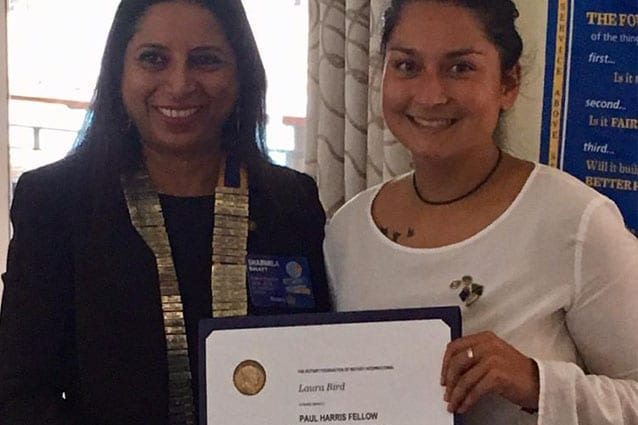
ST JUDE’S DAY GIVING
Each year at our St Jude’s Day celebrations, students and their families donate small household goods to local orphanages and community centres, who also support some of Arusha’s most vulnerable people. It is a chance for our students to give thanks through service for the benefits they reap at St Jude’s.
On November 2, Earlyactors, secondary students and members of staff visited the centres to distribute their gifts.
Sayuni, also an Earlyactor in Standard 6, expressed joy at being able to give back to the community.
“It felt good [to give gifts] because it taught me how to help other people who are in need. It was fun because we spent time with children in the orphanages, answering their questions and encouraging each other to study hard,” she said.
Our students love giving back to their community. Give them a hand up by making a donation to St Jude’s.
Each year, The School of St Jude community comes together for a day of celebration in honour of its namesake, the patron saint of hopeless cases.
Founder, Gemma Sisia, chose the school’s name nearly 20 years ago as a nod to her own faith and belief that there is hope for every child to live a good life, rich with knowledge, love and compassion.
These three values were demonstrated at the 2018 St Jude’s Day celebration, celebrated on Friday October 26 at Smith Secondary Campus – two days before St Jude’s official Feast Day.
Our school’s students come from some of the most economically disadvantaged corners of Arusha. From families who hold on to steadfast hope that their child’s education will spread a ripple effect throughout their community and help them to navigate their way out of poverty.
Inspired by the gift of the free, quality education their child has received from St Jude’s, these families donate household goods and simple food items to others in even greater need within Arusha.
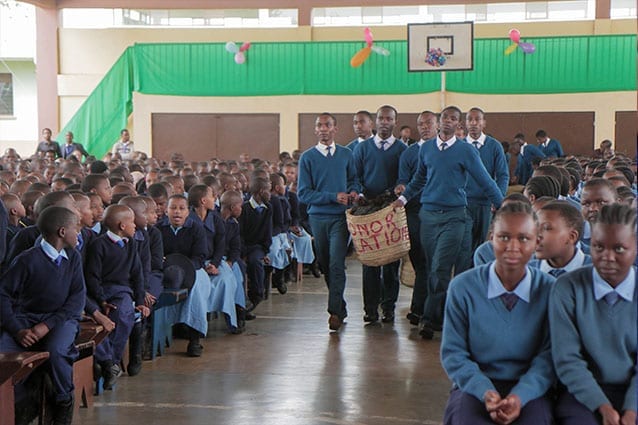
Students offered the gifts during a special Mass held at the beginning of St Jude’s Day and, in the days following, the gifts were distributed to orphanages and community centres.
Erick, a current Form 4 student and winner of the 2017 Young Scientist Tanzania competition, is aware of the importance of giving back.
“I could not be where I am now without support from St Jude’s. We as students will do whatever we can to spread the school’s message beyond our families. We want to help the community through the gift of education we have received,” he said.
St Jude’s Day was also a chance for the school’s youngest students to meet with their older peers, enjoying colourful performances together throughout the day.
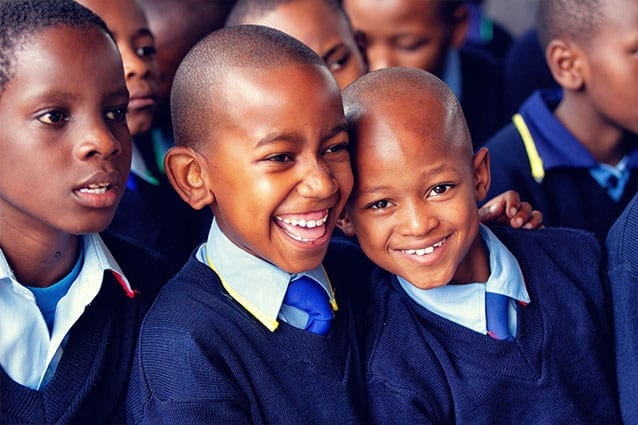
“I love seeing the secondary students in costume and dancing on the stage. They are very talented,” Emmy, a Standard 5 student at Sisia Primary Campus, said.
“Another good thing is the food. We eat royo (roast beef), bananas, rice and vegetables. It is delicious!” Emmy described.
To end the day of celebration, the school gathered after lunch for a concert, when primary and secondary student groups performed cultural dances and songs of gratitude to Mama Gemma and St Jude.
Class 2C from Sisia Primary Campus and the Ngoma Dance Club from Smith Secondary Campus emerged as the overall concert winners. Their combination of enthusiasm and the message their performances conveyed sent them soaring to the top of the judge’s lists!
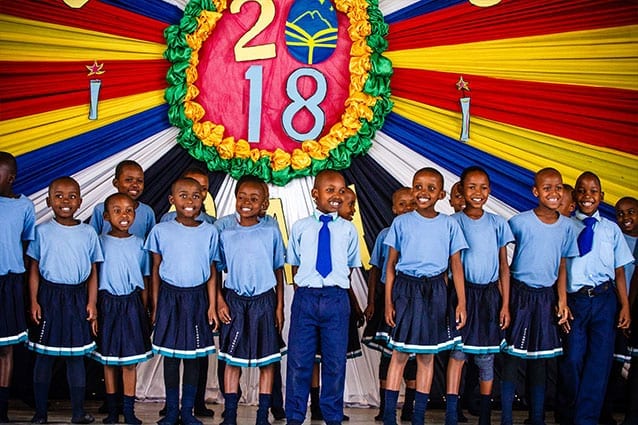
The day concluded with an impassioned vote of thanks from Academic Manager, Ms Liz, whose words drove home the premise on which St Jude’s was founded.
“St Jude is the patron saint of hopeless causes. I want each and every one of you to know that you are not a hopeless cause. You may face situations and circumstances which seem hopeless, but you must always hold on to the hope that you will be triumphant.”
Be a part of our students’ triumphant journeys and help them give back to their community. Become a sponsor today.
Diana and Abrahamani are St Jude’s new school prefects. As Head Girl and Head Boy, they personify the school’s core values: respect, responsibility, honesty and kindness, and are already making a difference as young leaders.
Both students joined St Jude’s as Standard 1 students in 2006, so they are well versed in what it takes to lead by example.
“A good leader is confident, honest and fair. A leader who favours the few cannot lead well. It Is a privilege to help lead my fellow students.” Diana said.
“It is true that St Jude’s values have taught us how to represent our peers. We understand that facing challenges is a part of leadership, and we are learning to solve problems in a diplomatic way,” Abrahamani added.
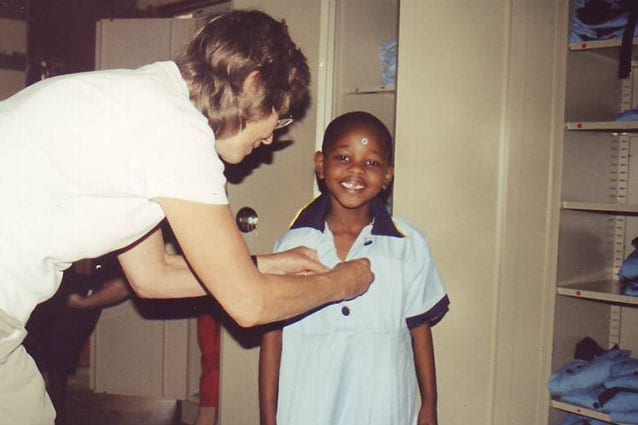
During their one year term as school leaders, Diana and Abrahamani have grand plans to increase student involvement in extracurricular activities, knowing that these programs give students the opportunity to enhance life skills and broaden their networks.
“We expect that through our leadership, more students will become involved in sports, essay competitions and motivate students to become involved with the many clubs on campus.”
“Such activities may motivate students in their studies also, and help them improve physical activity for overall health,” the students agreed.
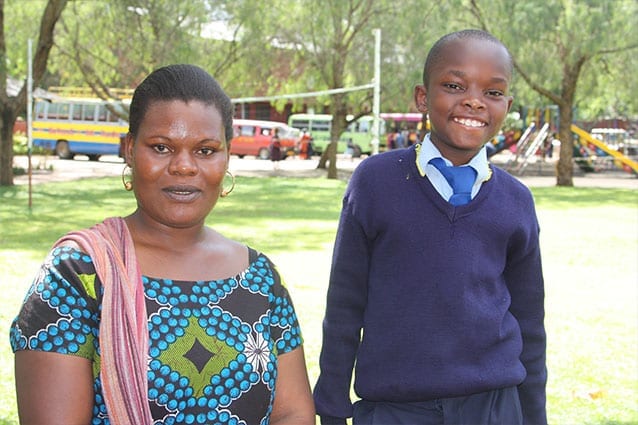
Diana and Abrahamani explained that they are inspired by student leaders who had come before them to apply for the school’s top democratically elected positions.
“We know that we can do a good job, just as those before us did. We also have a lot of support from academic staff. The teachers encourage us to try our best,” Abrahamani said.
“Mr Mcharo [Smith Secondary Campus Headmaster] in particular motivates us. He is a good listener and helps in every way he can. He works very hard to make sure our feedback is addressed,” Diana shared.
“As for me, I have learnt to be more confident. I can speak in front of large audiences, and even to groups of teachers when representing the students. It is very empowering,” she added.
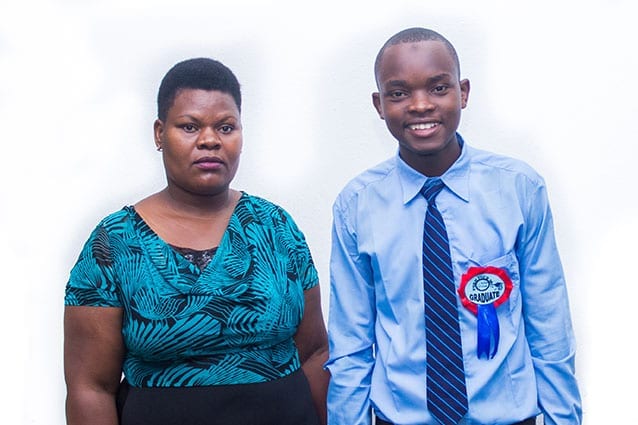
“In my case, the experience is teaching me to mature,” Abrahamani said.
“I know that we have the potential to be leaders not only in our school community, but to be inspiring role models for the wider community as well.”